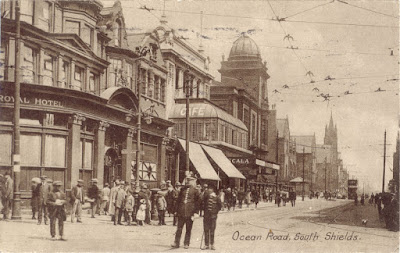To be known as a sailor in the old days was a true mark of pride, as Geordie describes as he continues his story below. This is the final instalment of the story as it was printed in the shields Gazette.
--
A Real Sailor
“A
few like myself with no great desire to be other than what was once our ideal
have stuck to the deck and the fo’c’sle but we are thinning in numbers.
“Last
time at home I passed by a ‘pub’ – yes, you hobos – I passed by a ‘pub’ – I do sometimes; it was near a dry dock. I
saw a gang of chaps having a pow-wow, ‘chewing the rag’ you know. As I went by
one of them grabbed my by the arm and in excitedly anxious tones, mellowed by a
few pints of beer, entreated me to tell the rest that he was a sailor.
“You
know me Geordie – I’m a sailor ain’t I – tell them I’m a sailor,”
“I
looked. Sure enough he was one o the sea lads I knew. Crippled on a government
trawler in the war he was; now not able to go to sea for a living.
“’You
bet you are, Fred,’ I said and he looked triumphantly at the crowd.
“The
old spirit lived. To be known as a sailor was his greatest pride.
“That
pride was held of course by all the old mates and skippers, in fact they
sometimes claimed a monopoly of it. There’s a yarn about a lady visitin’ to a
ship that will show you whiat I mean.
“She
was very inquisitive keeping her officer friends busy passing along
information. Noticing some of the crew working aloft, she asked –
“’Are
those the sailors?’”
“’Oh
no,’ she was informed by the mate, pointing to his pals of the afterguard, ‘We
are the sailors – They are the roustabouts.’
“You
see although most of the old forecastle hands were full of this pride of craft,
they were seldom given credit for it, and often treated as though they knew it
not.
Changing Times
“Times
have changed and many things are in a state of transition. It can’t be expected
of an old timer to see eye to eye with everything new. Changes are not always
for the best.” So you will understand some old Lord Nelson – as Bill remarked –
moaning about the passing of the spirit that animated him; he wonders – are
even the officers losing it.
“In
my last ship the second mate was a smart young chap who got his ticket at his
first attempt becoming second mate of the same ship in which he served his
time. Always in uniform he was modern – natty and scholarly – a real good sort
but – this is what he said to me at the wheel when the mate – an elderly man
who had been officer in sail – had left the bridge after a wrangle about the
ship’s position. ‘You know Brown we’ve got a mate on this ship but he’s simply
a sailor’. – What did he mean?
“There’s
a change alright boys. Of late when ever I take a pasear to the old hunting grounds, I find little
trace of the old type. A few riggers and sailors still haunt the Market Cross,
but in King Street – the one-time parade of the ‘crowds’ from the sailing
coasters – Whitstable men, Channel Islanders, Newhaven men, Devon men, to say
nothing of Geordies and Scotties – an unforgettable lot to those that knew
them, with their velvet collared coats, silver earrings, and unmistakeable
sailor air – there is no sign they were ever there.
Old Spirit Survives
“In
Ocean Road brassbounders bound no more, not roll gunnels under. They have
sailed away, leaving one or two old locals with a lot to think about as they
wander aimlessly, lost among the crowds of pleasure seekers making for the
beach – the Ocean roaders – “
Here
Geordie stopped overcome with emotion.
Bill,
ever ready, filled the gap, saying, “Never mind old hoss – old sailors never
die – you – well they’ll have to hang you – and don’t you worry about the sea
spirit. What about your young townie, the ordinary and the apprentice; I’m
damned sure they are full of it. What do you say, hombres?”
“Regular
young sea dogs,” was the opinion of the ‘hombres’. That given to show them they
were also, they sang with no uncertain voices a verse of
“We’ll
rant and we’ll roar
“Like
true British sailors.”
